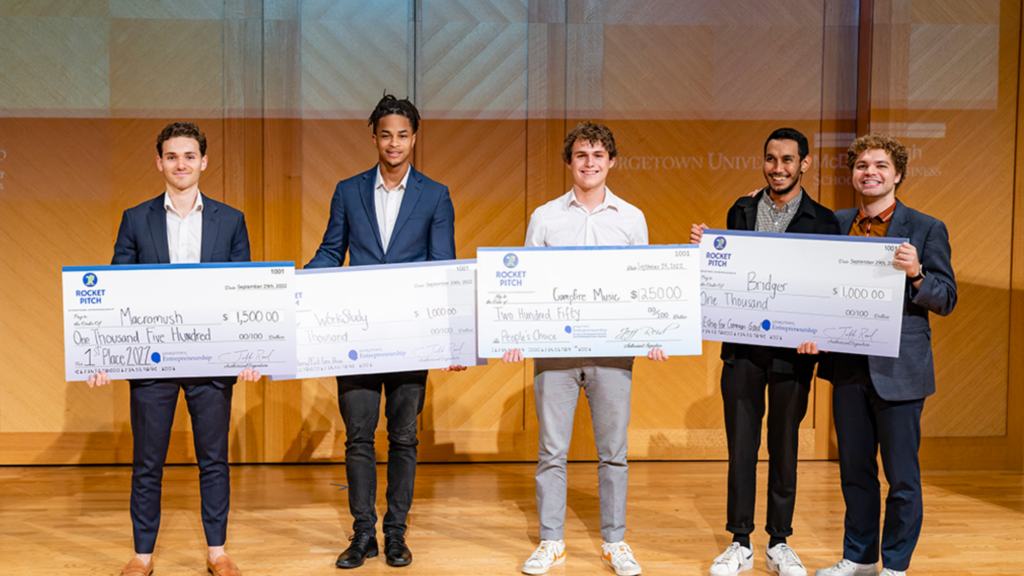Students in the McDonough School of Business presented their original ideas for potential startup ventures to receive grant money at the Fall 2022 Rocket Pitch Competition.
Georgetown Entrepreneurship, a McDonough School of Business initiative to support students interested in business foundation and management, hosted the event, in which 33 teams presented their venture ideas to a panel of seven judges. The judges consisted of business experts and executives, including Chris Comparato, CEO of restaurant management company Toast and the event’s keynote speaker. In total, judges awarded $4,500 in prize money across five teams for overall excellence, commitment to advancing the common good and audience votes.
Macromush, a protein bar company founded by Alexander McCarthy (MSB ’23), won first place for a white mushroom-based product that does not contain any of the eight major food allergens.
McCarthy said the idea for Macromush came from his personal frustration with searching for an allergy-friendly, healthy snack while working out.
“Trying to find quick snacks to fit into my busy days that were high in protein but did not source that protein from peanuts, tree nuts, or milk is a constant challenge,” McCarthy wrote to The Hoya. “I feel that the market does not address my pain point and that there must be many others that share in a similar struggle.”
McCarthy said he hopes to use the $1,500 grant he won from Rocket Pitch to start trying to make Macromush a reality.
“I felt vindicated in that a genuine problem I experience in my life resonated with the judges and audience,” McCarthy wrote. “I hope to use the funds to build a prototype protein bar and test product market fit. If it has legs, I will be looking to raise additional funding down the road to bring it to market.”
The Entrepreneurship for the Common Good Prize, a prize that goes to the pitch that best advances the public interest, went to Mason Kane (GRD ’23), Hussen Haikal Alhadar (GRD ’23) and Nehemia Abel (GRD ’23) for their app Bridger, a platform that connects migrant job seekers, particularly displaced refugees in Europe, to hiring companies.
According to Kane, the team’s venture was inspired, like McCarthy’s, by life experiences.
Kane said his empathy for immigrants who face information gaps when searching for jobs in their new countries sparked his desire to address this problem through entrepreneurship.
“Although I have been an exchange student several times, I cannot relate to those who seek asylum,” Kane wrote to The Hoya. “Still, I can understand trying to integrate and assimilate into European society. My inspiration for this project was the opportunity to apply my background in a practical, real-world scenario to effectuate change.”
Campfire Music Foundation, a nonprofit public-benefit music streaming platform founded by Johannes Larson (COL ’23) and Sophia Kloncz (COL ’23), won the People’s Choice Award through votes by attendees.
According to Larson, Campfire Music fills the gap left by a largely exploitative music industry that deprives artists of the majority of streaming revenue.
“To solve these problems, I founded Campfire Music Foundation, a nonprofit streaming startup founded to reduce issues of labor insecurity in the music industry and build public-benefit streaming infrastructure that pays artists fairly and transparently for their work at large scale,” Larson wrote to The Hoya. “My inspiration is to build a long-term solution to the issues facing today’s music industry, a solution that works for all stakeholders, and not just a few.”
Larson said the creativity and imagination required when developing a pitch like Campfire Music was a highlight of the experience.

“While writing a pitch, you realize that no one can tell your story better than you,” Larson said. “Writing a pitch almost feels like writing a song, more artistic than scientific at times.”
Beyond the field of business, McCarthy said the most important lesson he’ll take away from the competition is the importance of taking a chance on yourself.
“I prepped like I was competing for first but had no expectation that I would place and was just happy to have the platform to share my idea with like-minded classmates interested in solving problems,” McCarthy said. “If you have an idea, that’s enough to go out and compete.”




















